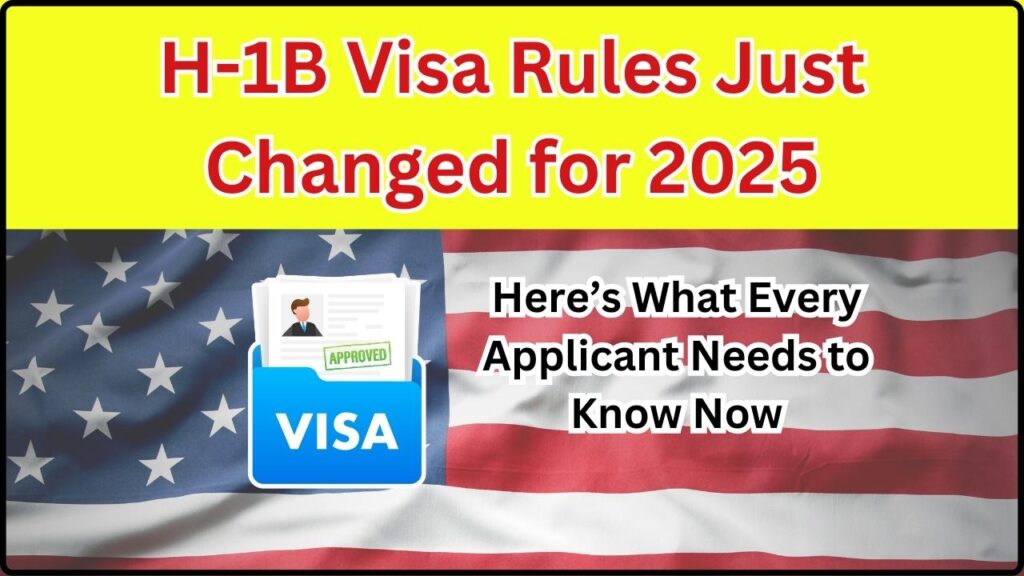
H-1B Visa Rules Just Changed for 2025: The H-1B visa program, a cornerstone for U.S. employers seeking to hire foreign professionals in specialty occupations, has undergone significant reforms effective January 17, 2025. These changes aim to enhance fairness, reduce fraud, and modernize the application process. Whether you’re an aspiring applicant or an employer, understanding these updates is crucial for navigating the new landscape.
H-1B Visa Rules Just Changed for 2025
The 2025 reforms to the H-1B visa program mark a significant shift towards enhancing the integrity and efficiency of the application process. By understanding and adapting to these changes, applicants and employers can navigate the system more effectively, ensuring compliance and increasing the likelihood of a successful petition.
| Aspect | Details |
|---|---|
| Specialty Occupation Definition | Degree must be directly related to job duties; general degrees like MBAs are limited unless explicitly connected to the role. |
| Lottery System | Beneficiary-centric; each applicant has an equal chance regardless of the number of registrations submitted on their behalf. |
| Cap-Gap Extension | F-1 students can maintain work authorization under OPT until April 1 of the following fiscal year. |
| Form I-129 Update | New edition effective January 17, 2025, aligning with regulatory changes. |
| Fraud Prevention | Stricter oversight; petitions can be denied or revoked if associated registration contains false information or invalid fees. |
| Employer Obligations | Employers must provide evidence of a bona fide job offer at the time of filing. |
| Application Fees | Base Filing Fee: $460; ACWIA Fee: $750–$1,500; Fraud Prevention Fee: $500; Premium Processing (Optional): $2,805; Public Law 114-113 Fee: $4,000 (for certain employers). |
| Registration Dates for FY 2026 | Opens: March 7, 2025; Closes: March 24, 2025; Earliest Filing Date: April 1, 2025. |
| Official Resources | USCIS H-1B Program |
Understanding the H-1B Visa Rules Just Changed for 2025
1. Revised Definition of “Specialty Occupation”
The U.S. Citizenship and Immigration Services (USCIS) has refined the criteria for what constitutes a “specialty occupation.” Now, the required degree must be directly related to the job duties, limiting the acceptance of general degrees like MBAs unless explicitly connected to the role.
Example: A software engineering position now requires a degree specifically in computer science or a closely related field, rather than a general business degree.
2. Beneficiary-Centric Lottery System
To curb multiple registrations for the same individual, the H-1B lottery now selects beneficiaries based on unique identifiers, such as passport numbers, ensuring each applicant has an equal chance regardless of the number of registrations submitted on their behalf.
Impact: This change promotes fairness by preventing employers from submitting multiple entries for the same applicant, thereby leveling the playing field.
3. Extended Cap-Gap for F-1 Students
F-1 students transitioning to H-1B status can now benefit from an extended “cap-gap,” allowing them to maintain work authorization under Optional Practical Training (OPT) until April 1 of the following fiscal year, reducing employment disruptions.
Benefit: This extension provides a seamless transition for international students, minimizing gaps in employment authorization.
4. Updated Form I-129
A new edition of Form I-129, effective January 17, 2025, must be used for all H-1B petitions. This form aligns with the latest regulatory changes and streamlines the application process.
Action Required: Employers and applicants must ensure they use the updated form to avoid processing delays.
5. Enhanced Fraud Prevention Measures
USCIS has implemented stricter oversight to prevent fraudulent activities, including denying or revoking petitions if the associated registration contains false information or if the registration fee is invalid.
Note: Accuracy and honesty in applications are more critical than ever to avoid penalties or disqualification.
6. Clarified Employer Obligations
Employers must now provide evidence of a bona fide job offer at the time of filing, eliminating speculative employment. This is particularly impactful for staffing and consulting firms, which must demonstrate that a specific position exists for the beneficiary.
Implication: Employers need to substantiate job offers with detailed documentation, ensuring the position is genuine and available.
Application Fees Overview
- Base Filing Fee: $460
- ACWIA Fee: $750–$1,500 (depending on employer size)
- Fraud Prevention Fee: $500
- Premium Processing (Optional): $2,805 for 15-day processing
- Public Law 114-113 Fee: $4,000 (for employers with 50+ employees, where over 50% are on H-1B or L-1 visas)
Tip: Employers should budget accordingly and ensure timely payment to avoid processing delays.
Registration Dates for FY 2026 H-1B Cap Season
- Registration Opens: March 7, 2025
- Registration Closes: March 24, 2025
- Earliest Filing Date for Selected Petitions: April 1, 2025
Reminder: Mark these dates on your calendar and prepare all necessary documentation in advance.
H-1B Visa Made Simple: New Rules Explained and Tips to Get Approved Fast!
What is H-1B Visa? Check Eligibility and Application Process!
May 2025 Visa Bulletin: Some Progress for India & China, No Relief Elsewhere!
Frequently Asked Questions (FAQs)
Q1: How does the new lottery system affect my chances of selection?
A1: The beneficiary-centric approach ensures each applicant has an equal opportunity, regardless of the number of registrations submitted on their behalf.
Q2: What constitutes a “specialty occupation” under the new rules?
A2: A specialty occupation now requires a degree directly related to the job duties. General degrees are insufficient unless explicitly connected to the role.
Q3: Can F-1 students continue working while awaiting H-1B approval?
A3: Yes, the cap-gap extension allows F-1 students to maintain work authorization under OPT until April 1 of the following fiscal year.
Q4: What are the consequences of providing false information in the application?
A4: USCIS may deny or revoke petitions if associated registrations contain false information or invalid fees.
Q5: How can employers demonstrate a bona fide job offer?
A5: Employers must provide detailed documentation, such as job descriptions and employment contracts, to substantiate the legitimacy of the job offer.








